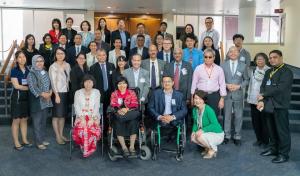
Persons with disabilities in Asia and the Pacific often fail to be included within social protection schemes, increasing their likelihood of living in poverty. Available data reveals differences in poverty rates between persons with disabilities and the overall population range from 3.9 to 20.6 per cent.[1]
Social protection, through policies and programmes designed to promote the well-being of persons with disabilities, is a crucial mechanism to address all forms of inequality, particularly helping to ensure equal access to all-inclusive healthcare and income security. It is for this reason that the implementation of social protection systems is recognized as an important component of the 2030 Agenda for Sustainable Development.
Organised by the Social Development Division of the United Nations Economic and Social Commission for Asia and the Pacific (ESCAP), in conjunction with the fifth session of the Committee on Social Development, the Workshop on “The Right to Social Protection: From Traditional Disability Welfare to Social Inclusion” was held on 30 November 2018 at the United Nations Conference Centre (UNCC), conducted in English with Thai language and Thai Sign language interpretation.
The panel, comprising of representatives who are persons with disabilities, regional policymakers and academics, provided diverse perspectives on the ideals, achievements and challenges faced in designing and implementing disability-inclusive inclusive social protection policies, programmes and services. Through fruitful breakout discussions with participants, solutions to address current challenges were also proposed and deliberated.
To access e-resources from the workshop, please visit: https://tinyurl.com/socialprotectionresources
[1] ‘Building Disability-Inclusive Societies in Asia and the Pacific: Assessing Progress of the Incheon Strategy’

